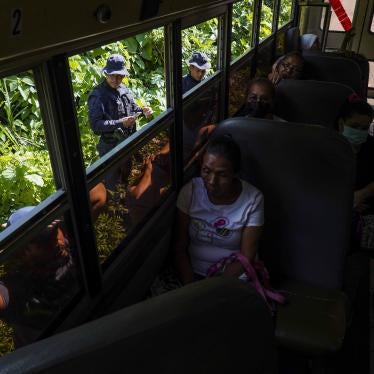(Santiago) — Following the arrest today in Santiago of former Peruvian President Alberto Fujimori, the Chilean authorities must ensure that extradition proceedings are carried out fairly and expeditiously, Human Rights Watch said.
Fujimori, who governed Peru from 1990-2000 and has subsequently lived in Japan, faces criminal charges in Peru for acts of corruption and human rights abuses, including homicide, acts of torture and forced disappearances. He arrived in Santiago yesterday and was detained this morning, after Peru submitted a formal request for his arrest.
Fujimori made the trip at a time of tense relations between Peru and Chile due to a dispute over maritime limits between the two countries.
“Apparently Fujimori thought he could exploit tensions between the two countries to plot his return to Peru,” said José Miguel Vivanco, Americas director of Human Rights Watch. “But given the record of Chilean courts on extradition cases, it’s still too early to know whether he miscalculated.”
A Chilean Supreme Court Justice must now determine whether basic conditions have been met to grant Peru’s request for Fujimori’s extradition. Chilean courts have rejected Peruvian extradition requests in other corruption cases linked to the Fujimori regime.
“The Chilean judiciary did the right thing by ordering Fujimori’s arrest,” said Vivanco. “Now it needs to determine whether his days of evading justice are over.”
Although elected democratically in 1990, Fujimori later arrogated authoritarian powers. In April 1992, he dissolved Peru’s Congress and had a new constitution drafted. Using extortion and bribery, Fujimori and his close advisor Vladimiro Montesinos came to control the attorney general’s office, the judiciary, the elections system and much of the news media.
In November 2000, Fujimori’s government collapsed in a corruption scandal and Fujimori himself fled to Japan, taking advantage of his claim to Japanese nationality.
After Fujimori’s government collapsed, special prosecutors in Peru initiated large-scale investigations of the corruption and human rights abuses in his regime. Nearly 1,500 persons are being prosecuted for acts of corruption allegedly committed under the Fujimori regime. Montesinos and more than 40 members of the “Colina Group,” a death squad allegedly controlled by Fujimori and Montesinos, are currently on trial in Lima.
Fujimori has been charged in Peru with involvement in the Colina Group’s extrajudicial execution of 15 people at a barbecue in the Barrios Altos district of Lima in November 1991. He has also been charged in the forced disappearance and murder of nine students and a teacher from La Cantuta University in July 1992.
For years, prosecution of the Colina Group for these crimes was blocked by a sweeping amnesty law passed by the Fujimori-controlled Congress in 1995. The Inter-American Court of Human Rights subsequently found that the law violated the American Convention on Human Rights.
Additional human rights charges against Fujimori include numerous homicides and forced disappearances allegedly committed in the basement of the Army’s Intelligence Service, as well as the torture of journalist Fabian Salazar after the latter obtained film footage implicating members of the Fujimori government in acts of corruption.
The corruption charges include Fujimori’s alleged illegal transfer of US$15 million from the national treasury to Montesinos, payments of bribes to national congressmen in exchange for their loyalty to the government, and involvement in diverting public funds for personal gain.
Contrary to Fujimori’s claim that he is the subject of political persecution, Human Rights Watch said that the crimes for which he is wanted cannot be considered “political crimes,” which are exempted under the Chile-Peru extradition treaty.
Japanese authorities have resisted requests by the Peruvian government for Fujimori’s extradition.






